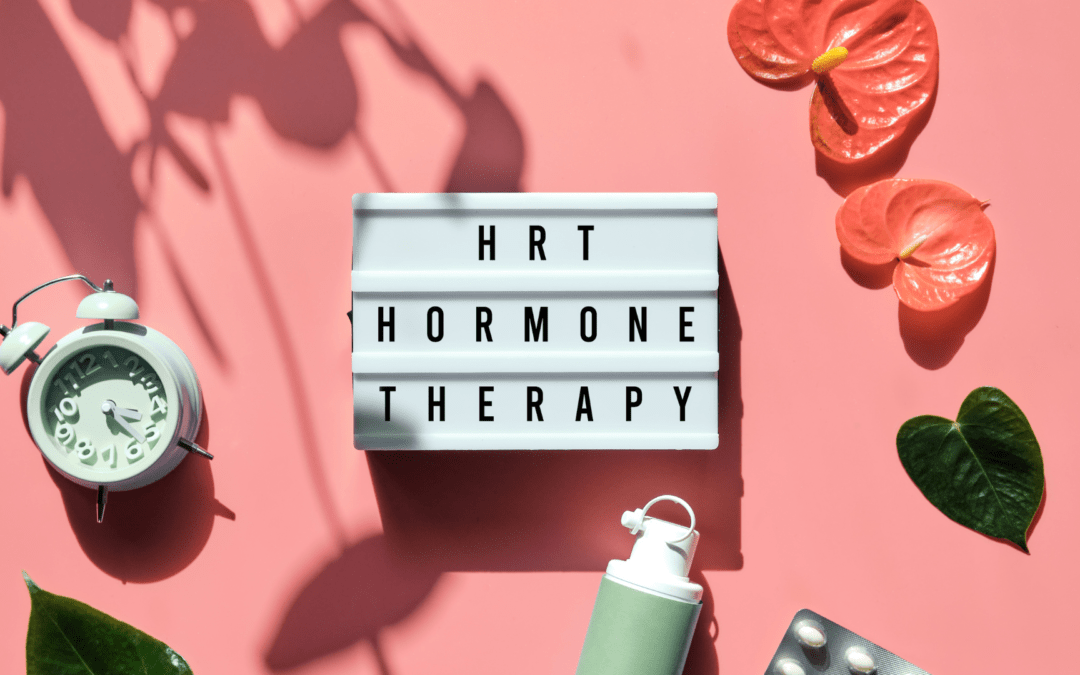When your ovaries are removed before natural menopause, your estrogen levels can drop by up to 90% in a matter of hours. And just like that, your body’s support system for sleep, mood, bone health, memory, and temperature control is gone.
This is why surgical menopause can feel so intense—especially if you weren’t already in perimenopause before surgery.
What Is HRT, Really?
HRT stands for Hormone Replacement Therapy. And it’s exactly what it sounds like—replacing the hormones your body used to make on its own.
For women in surgical menopause, this usually means adding estrogen back in. Some women may also need a form of progesterone, depending on whether they still have a uterus.
HRT can come in different forms:
-
- Pills
- Patches
- Creams or gels
- Pellets or injections (yep, Amazing Meds offers these)
The main goal? Help you feel like yourself again—mentally and physically.
Why Would You Even Consider HRT?
Let’s break it down simply. Here’s what estrogen used to do for your body:
-
- Kept your temperature regulated
- Helped your brain function clearly
- Kept your bones strong
- Supported your heart
- Smoothed out your mood
- Maintained vaginal tissue and moisture
- Helped you sleep
So when your ovaries are removed, and that hormone supply disappears instantly, Your body reacts quickly—and not always kindly. That’s why HRT can make a big difference, especially if:
- You’re under 45
- You weren’t already in menopause before surgery
- You’re experiencing symptoms that mess with your daily life
Many women who try HRT say it helped them feel like themselves again—more balanced, more comfortable, more in control.
But Wait—Is HRT Safe?
That’s the big question, right? And here’s the honest answer:
For many women, HRT is safe—and even protective—when started early. Especially within 10 years of menopause or before age 60.
But there are some factors to consider:
-
- History of breast or uterine cancer? HRT may not be recommended.
- Blood clotting disorders? Oral HRT may not be ideal, but non-oral options might be.
- Unmanaged high blood pressure? That needs attention first.
This is why the decision is never “yes or no.” It’s “let’s look at your whole health picture together.”
What Are the Real Benefits of HRT?
Research and clinical experience have shown that Hormone Replacement Therapy (HRT) can offer several benefits for women undergoing surgical menopause:
🔥 Alleviation of Hot Flashes & Night Sweats
HRT is effective in reducing vasomotor symptoms such as hot flashes and night sweats, leading to improved sleep quality and daily comfort.
😵💫 Improvement in Cognitive Function
Some studies suggest that HRT may help in maintaining cognitive function and reducing the risk of cognitive decline, especially when initiated near the onset of menopause. PMC
😤 Mood Stabilization
Estrogen therapy has been associated with mood stabilization, potentially alleviating mood swings and depressive symptoms in menopausal women.
💔 Bone Health Maintenance
HRT helps in preserving bone density, thereby reducing the risk of osteoporosis and fractures in postmenopausal women.
💓 Cardiovascular Support
Initiating HRT closer to the onset of menopause may have a neutral or beneficial effect on cardiovascular health, though this is influenced by individual health profiles and timing of therapy initiation.
Who Should Probably Consider It?
HRT might be a great fit if:
-
- You had your ovaries removed and were still years away from natural menopause
- You feel wiped out from symptoms like heat waves, mood shifts, or sleepless nights
- You want to protect your bones, brain, and heart long-term
Your doctor gives you the green light after reviewing your personal history
What If You’re Not Sure—or Not Into It?
That’s totally okay. HRT isn’t your only option.
Here’s what some women explore instead or alongside:
-
- Non-hormonal meds – like SSRIs or gabapentin (often used for sleep or hot flashes)
- CBT (cognitive behavioral therapy) – super helpful for anxiety or emotional crashes
- Nutrition and exercise – seriously underrated, especially for bone strength and mental clarity
- Herbal support or acupuncture – some women swear by it, and it may be worth trying with a qualified practitioner
- Low-dose vaginal estrogen only – helpful for intimacy or dryness without full-body hormone exposure
This isn’t a race. You’re allowed to explore slowly, try different things, and change your mind later.
Real Women, Real Experiences
Hearing from women who’ve navigated surgical menopause can provide valuable insights:
Erin’s Experience
At 41, Erin underwent oophorectomy, leading to immediate surgical menopause. She reported experiencing severe menopausal symptoms and highlighted the need for comprehensive information and support during this transition.
Jules’s Journey
Jules experienced surgical menopause at 39 following a total hysterectomy. She emphasized the importance of starting HRT immediately after surgery, as advised by her surgeon, to mitigate menopausal symptoms.
Hearing real voices matters. Erin and Jules share what helped, what surprised them, and what they wish they’d known earlier.
What We Do at Amazing Meds
We know this choice can feel overwhelming. That’s why we make it simple and supportive.
-
- ✅ Test your current hormone levels
- ✅ Review your history, risks, and symptoms
- ✅ Talk through your goals and options—no pressure, ever
- ✅ Build a plan that works for real life—not just a medical chart
👉 Schedule a call here if you want to explore your options. You’ll talk to someone who actually understands what you’re going through.
Final Word
You didn’t choose surgical menopause—but you can choose how you move forward.
Whether it’s HRT, lifestyle shifts, or a mix of things, you deserve answers, relief, and a clear next step.
You’re not broken. You’re in a new phase—and we’re here to help you navigate it with clarity, confidence, and support.
Disclaimer: This blog post provides general information about surgical menopause and should not be considered medical advice. Always consult with your own qualified healthcare provider for diagnosis, treatment, and personalized recommendations.

Celeene Rae
Writer & Blogger @ Amazing Meds


0 Comments